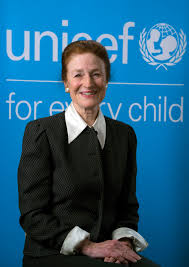
“Migrating is not a choice”, according to Henrietta Fore, executive director of the United Nations Children’s Fund (UNICEF), speaking to reporters last week on the sidelines of the G7 ministerial summit in Paris. Fore insisted: "Migrants do not want to leave their country, but they are forced to do so because of the economic situation or the violence that reigns there." (All emphases added.) For example, she said the northern and southern borders of Mexico are overwhelmed with migrants because the two principal causes driving people out of their country are not dealt with: "one concerns violence of criminals and gangs and the other the need to find a source of income."
Whether in Syria, Libya, Central America, or elsewhere, the condition of young migrants is globally "catastrophic", lamented Fore, who concluded: "those of us who live in more developed countries must do whatever we can to allow them to get here and integrate."
Fore, a former American diplomat, became UNICEF's seventh executive director in January 2018. Fore was the first woman to serve as administrator of the U.S. Agency for International Development (USAID) and director of U.S. foreign assistance from 2007 to 2009. In that position, she managed $39.5 billion of U.S. foreign assistance annually.
UNICEF is funded by governments and private donations. Due to relentless lobbying on Capitol Hill by UNICEF USA supporters, the United States has "traditionally provided more unrestricted funding to UNICEF than any other government." The U.S. remains UNICEF’s top funder with $132.5 million in 2019, just as it was in 2016, 2017, and 2018 with similar contributions.
What remains to be determined is why the Trump administration continues to write a blank check to a UN organization whose take on migration seems to be in direct contradiction with that of the current U.S. government.
